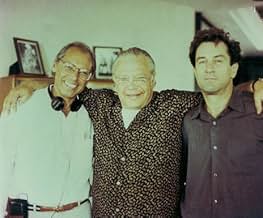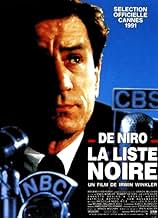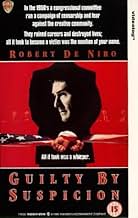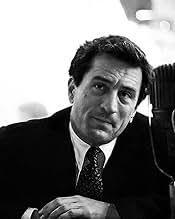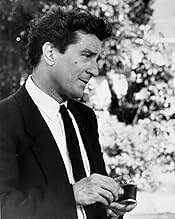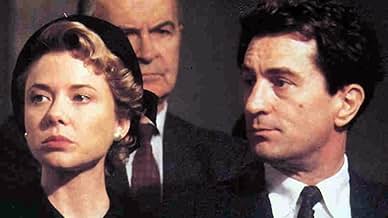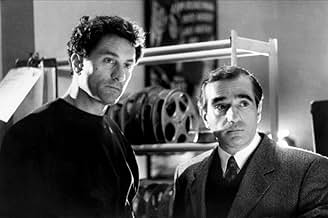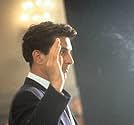VALUTAZIONE IMDb
6,5/10
10.041
LA TUA VALUTAZIONE
Tornato ad Hollywood nel 1951 dopo aver lavorato in Francia, un regista cinematografico si scontra con la politica di McCarthy.Tornato ad Hollywood nel 1951 dopo aver lavorato in Francia, un regista cinematografico si scontra con la politica di McCarthy.Tornato ad Hollywood nel 1951 dopo aver lavorato in Francia, un regista cinematografico si scontra con la politica di McCarthy.
- Regia
- Sceneggiatura
- Star
- Premi
- 2 vittorie e 2 candidature totali
Roxann Dawson
- Felicia Barron
- (as Roxann Biggs)
Recensioni in evidenza
This is a fairly good movie. It provides a compelling dramatic struggle and captures the paranoia of an era. However, like many Hollywood movies, it strives more to create a dramatic story than an accurate one.
This movie was originally to be based on the life of blacklisted writer/director Abraham Polonsky (Force of Evil, Body and Soul). Polonsky was working in France at the time of the HUAC hearings and a friend called to tell him not to come back or he'd be called to testify. He deliberately came back for the express purpose of telling HUAC where they could stick it. This is a good story as an anecdote, but not a great story for a movie.
The one place in which this movie (and many other movies) softens the history is by making the protagonist politically neutral. It is certainly true that many people accused were not communists or had only attended a meeting out of curiosity, but this is not true for everybody. Many of these people were devout socialists. As Polonsky has said on occasion "During the Great Depression, anybody with a brain considered Communism. The Capitalist system was BROKE. Communism looked like a smart bet." While many of these people reconsidered as the nation returned to prosperity, a large number did not.
Most of the famous Hollywood Ten were still believers in socialism when they were blacklisted. There is no evidence that any of them were spies for the Soviet Union-- many of them had already learned that the USSR was not the socialist paradise they dreamed of-- but they did believe in the writings of Mark and Engels. It is also true that they placed socialist themes in their films. They created gangsters who only cared about money, families screwed over by greedy real estate brokers and poor saps who put it all in the stock market.
However, none of this was illegal. They had every right to believe in whatever politics they chose to. They had every right to create these films-- and their movies seemed to have a resonance with the audience. They're lives and careers were destroyed because they held political beliefs that some viewed as threatening.
I also want to point out that Elia Kazan was not the model for this film. Elia Kazan has been repeatedly condemned by Polonsky and others who were blacklisted. He chose to name names and to allow the HUAC to bully him. I don't condemn him for this like other people. As this movie shows, so much was on the line for people who HUAC sets their sights on. Kazan cracked. He failed to be a hero, when the time came. This doesn't mark him a coward, merely something less than a hero. "On the Waterfront," while not a direct explanation of his actions, is an excellent look at his state of mind around that time.
While yes, I have not spent much time reviewing this movie, I felt it necessary to set the record straight about history.
This movie was originally to be based on the life of blacklisted writer/director Abraham Polonsky (Force of Evil, Body and Soul). Polonsky was working in France at the time of the HUAC hearings and a friend called to tell him not to come back or he'd be called to testify. He deliberately came back for the express purpose of telling HUAC where they could stick it. This is a good story as an anecdote, but not a great story for a movie.
The one place in which this movie (and many other movies) softens the history is by making the protagonist politically neutral. It is certainly true that many people accused were not communists or had only attended a meeting out of curiosity, but this is not true for everybody. Many of these people were devout socialists. As Polonsky has said on occasion "During the Great Depression, anybody with a brain considered Communism. The Capitalist system was BROKE. Communism looked like a smart bet." While many of these people reconsidered as the nation returned to prosperity, a large number did not.
Most of the famous Hollywood Ten were still believers in socialism when they were blacklisted. There is no evidence that any of them were spies for the Soviet Union-- many of them had already learned that the USSR was not the socialist paradise they dreamed of-- but they did believe in the writings of Mark and Engels. It is also true that they placed socialist themes in their films. They created gangsters who only cared about money, families screwed over by greedy real estate brokers and poor saps who put it all in the stock market.
However, none of this was illegal. They had every right to believe in whatever politics they chose to. They had every right to create these films-- and their movies seemed to have a resonance with the audience. They're lives and careers were destroyed because they held political beliefs that some viewed as threatening.
I also want to point out that Elia Kazan was not the model for this film. Elia Kazan has been repeatedly condemned by Polonsky and others who were blacklisted. He chose to name names and to allow the HUAC to bully him. I don't condemn him for this like other people. As this movie shows, so much was on the line for people who HUAC sets their sights on. Kazan cracked. He failed to be a hero, when the time came. This doesn't mark him a coward, merely something less than a hero. "On the Waterfront," while not a direct explanation of his actions, is an excellent look at his state of mind around that time.
While yes, I have not spent much time reviewing this movie, I felt it necessary to set the record straight about history.
Some Americans today may never have heard of Senator Joseph McCarthy and McCarthyism. McCarthyism is the practice of making accusations of subversion or treason without proper regard for evidence. The term refers to U.S. senator Joseph McCarthy (R-Wisconsin) and has its origins in the period in the United States known as the Second Red Scare, lasting from the late 1940s through the 1950s. It was characterized by heightened political repression and a campaign spreading fear of communist influence on American institutions and of espionage by Soviet agents. After the mid-1950s, McCarthyism began to decline, mainly due to the gradual loss of public popularity and opposition from the U.S. Supreme Court led by Chief Justice Earl Warren. The Warren Court made a series of rulings that helped bring an end to McCarthyism.
The movie "Guilty by Suspicion" takes place in Hollywood during the height of the Second Red Scare. The movie focuses on David Merrill (Robert De Niro) though he is indicative of many Hollywood personnel affected by the Communist witch hunting.
David, by all indications, was a gainfully employed movie director that was in constant demand. He would have been able to stay gainfully employed so long as he told the F.B.I. what they wanted to hear. And they wanted to hear that certain friends of David's were Communists. David, valuing friendship over finances, opted to keep quiet about any of his friends activities. For that, David was put on the Hollywood blacklist.
"Guilty by Suspicion" is a weighty movie. We get an up close and personal look at what McCarthyism was doing to people's lives. Now I know that some of you may be saying, "Who cares? It was Hollywood." To that I would say that the Constitution never put zoning restrictions on who it applied to. The Constitution didn't have a Hollywood exemption in it and the U.S. government was trampling all over people's Constitutional rights. If they didn't have enemies within the U.S. they were certainly making them.
The movie "Guilty by Suspicion" takes place in Hollywood during the height of the Second Red Scare. The movie focuses on David Merrill (Robert De Niro) though he is indicative of many Hollywood personnel affected by the Communist witch hunting.
David, by all indications, was a gainfully employed movie director that was in constant demand. He would have been able to stay gainfully employed so long as he told the F.B.I. what they wanted to hear. And they wanted to hear that certain friends of David's were Communists. David, valuing friendship over finances, opted to keep quiet about any of his friends activities. For that, David was put on the Hollywood blacklist.
"Guilty by Suspicion" is a weighty movie. We get an up close and personal look at what McCarthyism was doing to people's lives. Now I know that some of you may be saying, "Who cares? It was Hollywood." To that I would say that the Constitution never put zoning restrictions on who it applied to. The Constitution didn't have a Hollywood exemption in it and the U.S. government was trampling all over people's Constitutional rights. If they didn't have enemies within the U.S. they were certainly making them.
Robert DeNiro plays David Merrill, a movie director who is 'Zanuck's wonder boy' at Fox as the movie opens. He's been in Europe for awhile so does not know the full impact the HUAC has been exerting on actors in Hollywood. Zanuck asks David to 'purge himself' so instructs him to meet with a man who has a lot of questions for him, all having to do with people he might or might not know (real actors names are mentioned in this scene) and DeNiro complies, but only to a point, because his best friend Bunny Baxter (George Wendt) is the last name on the 'list.' David can't deal with any of it anymore and storms out of the meeting.
Eventually he finds out the hard way that because he is being uncooperative, he is being portrayed as a Communist sympathizer and cannot get anymore work as a director in movies so he moves to New York to try to get work in the theatre.
Movie has a strange feel to it. There is something underlying in almost every scene, a strange current that flows through the movie because so much of this is about what is unsaid, what is damaging and what is the right thing to do. Husbands betray wives, best friends name best friends, and no one knows how to destroy this thing that has invaded them.
DeNiro, Annette Bening, George Wendt and Chris Cooper are riveting. Sam Wanamaker, Martin Scorsese, Tom Sizemore and Ben Piazza are very good in small roles. Patricia Wettig goes slightly over the top as an actress whose child was taken from her.
Not fun, but worth seeing, and for fans of old cars, DeNiro drives around in the most beautiful white convertible you've ever seen. Wish I knew what type of car it is! 8/10.
Eventually he finds out the hard way that because he is being uncooperative, he is being portrayed as a Communist sympathizer and cannot get anymore work as a director in movies so he moves to New York to try to get work in the theatre.
Movie has a strange feel to it. There is something underlying in almost every scene, a strange current that flows through the movie because so much of this is about what is unsaid, what is damaging and what is the right thing to do. Husbands betray wives, best friends name best friends, and no one knows how to destroy this thing that has invaded them.
DeNiro, Annette Bening, George Wendt and Chris Cooper are riveting. Sam Wanamaker, Martin Scorsese, Tom Sizemore and Ben Piazza are very good in small roles. Patricia Wettig goes slightly over the top as an actress whose child was taken from her.
Not fun, but worth seeing, and for fans of old cars, DeNiro drives around in the most beautiful white convertible you've ever seen. Wish I knew what type of car it is! 8/10.
Director David Merrill (Robert De Niro) returns from filming in France to find the country over-run by the Red Scare. People are all taking loyalty oaths. The House Committee on Un-American Activities is hunting for Communists. Bunny Baxter (George Wendt) is his writer best friend. Actress friend Dorothy Nolan (Patricia Wettig) is struggling after her husband named names. David's married to Ruth (Annette Bening) with a young son. Friendships and marriages are breaking apart as tension rises. With his work on the line, Merrill is also pushed to name names as others acquiesce.
It's a sincere telling of a fictional Red Scare story with some of the real players in the real history of the Un-American Activities Committee. It's very sincere but not the most thrilling drama. The actors are first rate. Despite the good work, there are no surprises and nothing too dramatic. It feels more or less melodramatic. This is one movie where a based on true story would be useful.
It's a sincere telling of a fictional Red Scare story with some of the real players in the real history of the Un-American Activities Committee. It's very sincere but not the most thrilling drama. The actors are first rate. Despite the good work, there are no surprises and nothing too dramatic. It feels more or less melodramatic. This is one movie where a based on true story would be useful.
Upon reading through 20 or so of the last reviews of "Guilty by Suspicion" it dawned on me that the majority of the reviewers are only vaguely familiar with the history associated with the film. Robert De Niro's DAVID MERRILL is an almost direct representation of real-life director ELIA KAZAN, known for such great films as "A Streetcar Named Desire" and "On the Waterfront". Only the names have been changed, but the main points of KAZAN's struggle are all intact. Even long-time friend Arthur Miller and wife Marilyn Monroe make an appearance (under different names, of course).
The story depicted in this film is not only perfectly representational of the black list era Hollywood, but is actually perfectly factual and accurate down to the small details. Reviewers should really do more research before "guessing" at what they just saw.
The story depicted in this film is not only perfectly representational of the black list era Hollywood, but is actually perfectly factual and accurate down to the small details. Reviewers should really do more research before "guessing" at what they just saw.
Lo sapevi?
- QuizMartin Scorsese portrays a fictional director called "Joe Lesser". This character is based on director Joseph Losey, who left Hollywood in the 1950s rather than face the HUAC examinations.
- BlooperThere is a Milwaukee Braves baseball pennant on the wall of Merrill's son's room. This film takes place in 1951 and 1952. The Braves didn't move to Milwaukee from Boston until 1953.
- Citazioni
David Merrill: [to the Blacklist Committee] Fuck them!
- Colonne sonoreStraighten Up and Fly Right
Written by Nat 'King' Cole and Irving Mills
Performed by Nat 'King' Cole
Courtesy of Capitol Records, Inc.
By arrangement with CEMA Special Markets
I più visti
Accedi per valutare e creare un elenco di titoli salvati per ottenere consigli personalizzati
- How long is Guilty by Suspicion?Powered by Alexa
Dettagli
Botteghino
- Budget
- 13.000.000 USD (previsto)
- Lordo Stati Uniti e Canada
- 9.480.198 USD
- Fine settimana di apertura Stati Uniti e Canada
- 2.278.290 USD
- 17 mar 1991
- Lordo in tutto il mondo
- 9.480.198 USD
- Tempo di esecuzione1 ora 45 minuti
- Colore
- Mix di suoni
- Proporzioni
- 1.85 : 1
Contribuisci a questa pagina
Suggerisci una modifica o aggiungi i contenuti mancanti



